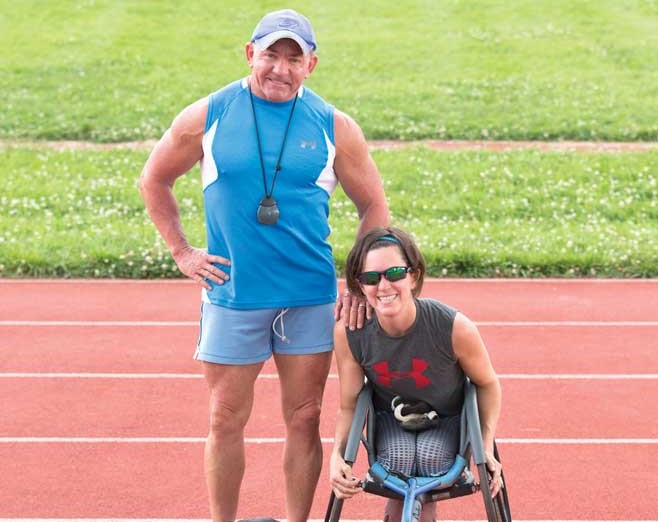When she’s not working toward her Ph.D. in movement science from Washington University, Kerri Morgan trains on the track. Although her movement is limited from the chest down, that hasn’t stopped her from becoming a highly decorated athlete. She has participated in multiple international competitions, winning a number of medals in track and field events, including gold in the 2012 U.S. Paralympic trials, gold and silver in the 2010 IPC World Championship, and bronze in the 2012 Paralympic Games. She also won gold in the 2009 rugby Americas Zone Championship.
Paralyzed since age 1 after a childhood illness, Morgan didn’t have a chance to participate in competitive sports growing up. “I never had that competitive fire in myself met, because there just weren’t opportunities for it,” she says. “I swam on the neighborhood and high school teams, but I couldn’t compete because I was swimming against able-bodied kids. In my 20s, when I started to see opportunities become available, I realized I could really compete at these top levels.”
Before delving into track and field, Morgan played rugby, joining the U.S. Paralympic Team in 2009, the first woman to do so. “I started playing for social and health reasons, and I began to see opportunities to take the sport to a higher level,” she says. She switched gears to track and field when she didn’t make the team the following year.
Training with a disability requires special care. In Morgan’s case, she has to keep her arms protected from injury. “I use my arms for everything in my life,” she says. “I have to take care of my shoulders, do rotator-cuff exercises, have clean, efficient biomechanics and not put any more stress on joints than is necessary.” Unable to fully sweat, Morgan keeps a spray bottle on hand to cool down and schedules training to avoid the hottest hours of the day.
Morgan credits her support system for contributing to her success. “As an athlete with a disability, it’s super important to have the right equipment and lots of support, and I’m fortunate to have a really strong coach and good family and friends,” she says.
[the routine]
I train six days a week, with one day off. Most days I’ll train twice, once in the morning and once in the evening. Some days I’ll go to the track twice, once to train on technical things and once to work on speed, acceleration and starts. Three times a week I’ll do strength training, and once or twice a week I’ll work in the pool, swimming laps or performing strengthening exercises for my shoulder.
Photo: Charles Barnes








